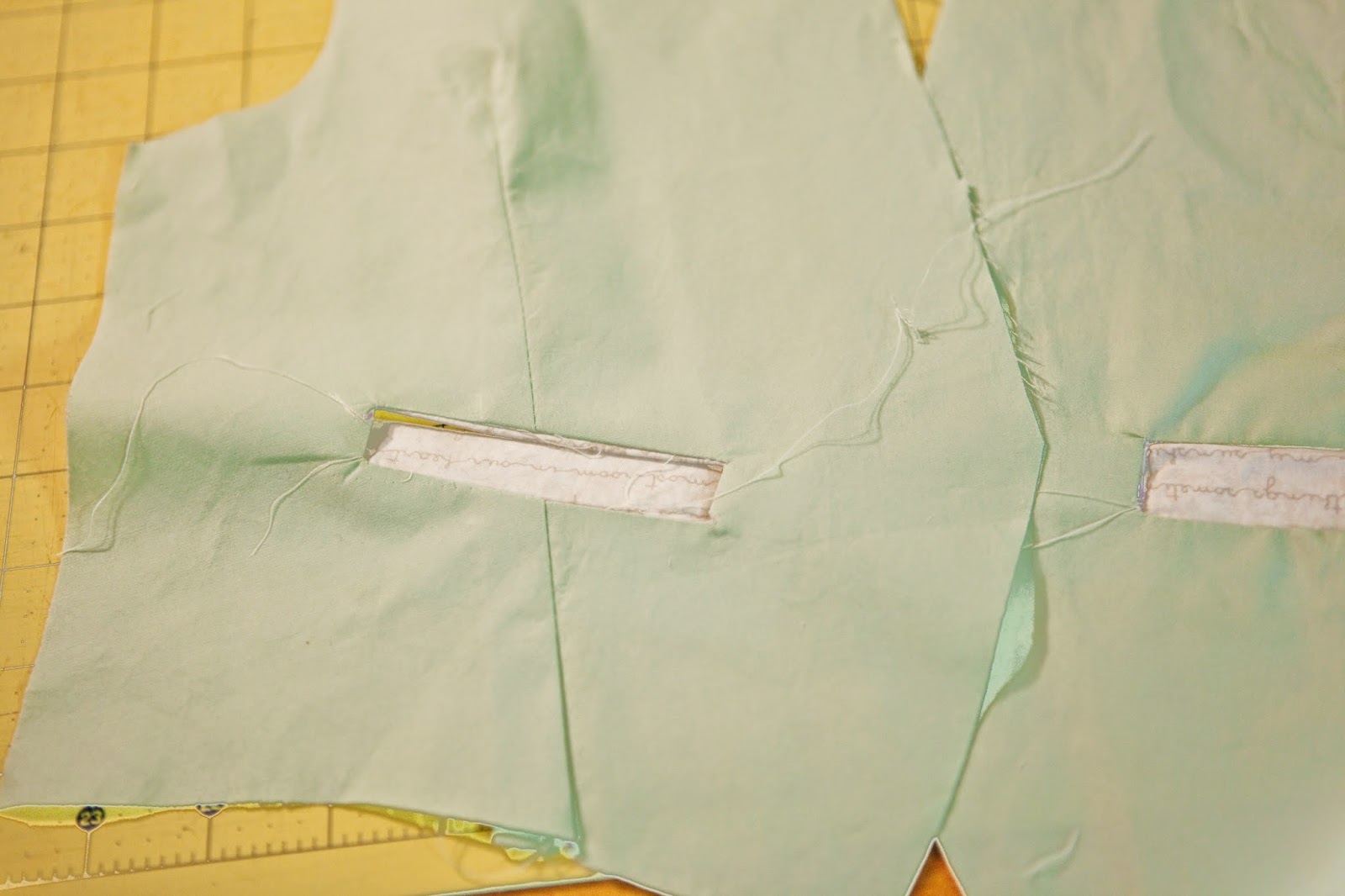Today we are starting with our vest. You are going to learn some awesome techniques in this pattern - and I promise, none of them are hard, they just take a bit of patience and time.
NOTE: Please make sure you read over the Art Museum pattern directions prior to starting this sew-along. You should keep these directions open and where you can read them as you go through these lessons. You might want to carefully read through this lesson also before beginning.If you have any questions, suggestions, or tips to share; please make sure to post them on our Facebook group. Also, if you would like to see any of the images larger that are posted in this blog, just click on them to enlarge.
Today we will be doing the initial prep and the welt pockets - ready.....set......GO!
The Vest:
- Take your cut vest pieces and lay them out in front of you - make sure that all of your markings have been transferred to your fabric.
- Start by sewing your dart. Fold the fabric right sides together with the dots of the dart matching, pin. Place a pin at the top of the dart and sew from the top of the dart down to the bottom in a straight line - if you are new, feel free to draw that line prior to sewing.
- Press the dart toward the side seam first from the wrong side, then flip your fabric over and press again for a clean finish (use spray starch as needed).
- Cut your interfacing according to the instructions.
- I like to do all my interfacing at the same time, so fuse the button hole interfacing to the WRONG side of your vest front (make sure the shiny side of the interfacing is placed shiny side down).
- Take your other pieces of interfacing and fuse them to your welt
pocket piece and to the wrong side of the vest front over the markings
(this will run over the darts that you already sewed).
- Breath, take a sip of wine - not the whole glass, just a sip!
- If you didn't fuse the welt pocket interfacing above, do so now.
- There should be interfacing on both the welt pocket and on the vest where the welt will be sewn - this is going to allow you to get a nice crisp welt opening.
- On the welt pocket, connect the dots of the marking with a straight line along the top and a straight line along the bottom.
- Place the welt pocket on the vest, right sides together, matching the markings.
- Pin in place.
- Sew along the straight lines - you want to make sure to start and stop exactly at the dots on each line. To make this easier, I like to lower my needle down right in the center of the dot and then start sewing. (I sew a couple stitches forward and then back tack.)
- Once your lines are sewn, you will want to draw a straight line down the center of the space between the two lines.
- You will draw a V in to the center line on each end.
- Cut along this line, cut all the way to the stitching, but not through it.
- Turn your welt pocket through the opening and to the wrong side of the vest.
- You are going to want to pull the fabric taught to create crisp edges around the welt opening.
- Press first from the wrong side, then flip to the right side and press carefully - you will probably need to pull the fabric in the corners to make them lay flat.
- Press well with lots of steam and spray starch to set the folds.
- From the wrong side, fold your fabric up until the fabric folds exactly at the top of the welt opening, press well.
- To set the pocket folds, you are going to sew along the ends where the triangles are - set your needle down at the top of the crease and sew down, repeat for the other side.
- Now that you have the welt opening, you are going to make the pocket - I'm going to diverge from the pattern slightly.
- Sew the bottom edge of the pocket bag to the bottom edge of the welt pocket, right sides together.
- Open the fabric and press the seam flat.
- Fold the pocket bag back to match the top of the welt pocket and sew in place.
- Press the fold.
- Sew both sides of the pocket bag.
- Repeat for the other side.
That is
it - we are done for the day!!!! How do you feel about welt pockets
now??? They are a bit finicky, but not really that hard and they are an
awesome detail to add to any garment. If you feel like you need more
practice - don't worry, you'll get to do more on the pants!
* If you would like to enter the prize drawing, please make sure you submit a picture of your completed lesson two to the Facebook Album by 12:00 noon CT, Thursday, March 12th. Also, if you have any questions the Facebook Group is a great place to ask.
Make sure to come back tomorrow for Lesson 3!
Suzanne

















No comments:
Post a Comment